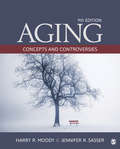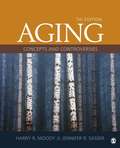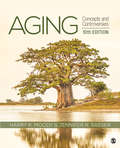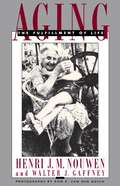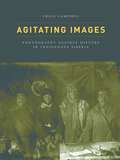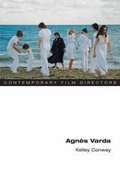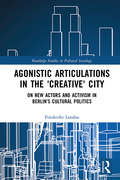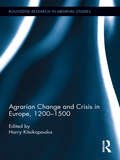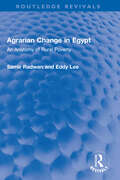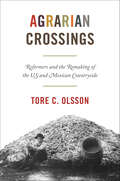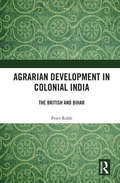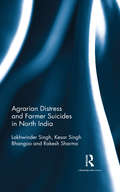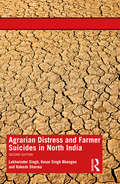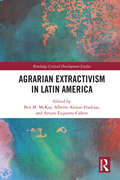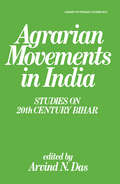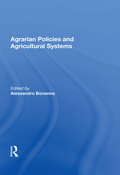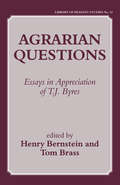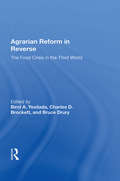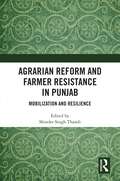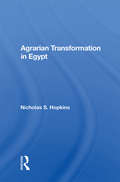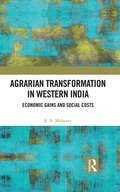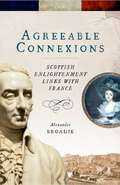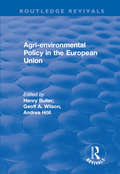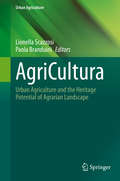- Table View
- List View
Aging: Concepts and Controversies
by Harry R. Moody Jennifer R. SasserPresenting current research in an innovative text-reader format, Aging: Concepts and Controversies, Ninth Edition encourages students to become involved and take an informed stand on the major aging issues we face as a society. Not simply a summary of research literature, Harry R. Moody and Jennifer R. Sasser’s text focuses on controversies and questions, rather than on assimilating facts or arriving at a single "correct" view about aging and older people. Drawing on their extensive expertise, the authors first provide an overview of aging in three domains: aging over the life course, health care, and the socioeconomic aspects of aging. Each section is followed by a series of edited readings, offering different perspectives from experts and specialists on that subject. New readings focus on whether current federal spending on the elderly is sustainable and fair to other groups, how older consumers are reshaping the business landscape, and the challenges of marketing and selling to customers 60 and over. More emphasis is placed on how social class and inequality earlier in life can shape our final years and the number of older Americans living in poverty. The section on Aging and Health Care has been thoroughly updated to reflect the latest data about chronic diseases that affect the elderly, government spending on health care, and policy changes to programs like Medicaid and Medicare. The section on the Social and Economic Outlook for an Aging Society gives the most current picture of the racial and ethnic diversity of older Americans, their participation in the labor force, and their income and wealth.
Aging: Concepts and Controversies (7th Edition)
by Harry R. Moody Jennifer R. SasserPresenting current research in an innovative format, Aging: Concepts and Controversies encourages students to become involved and take an informed stand on the major aging issues that we face as a society. Leading author and active expert in gerontology Rick Moody provides thorough explanation of the issues in the Concepts sections and current research in the Controversy sections, demonstrating the close link between concepts and controversies in these broad areas of aging: health care, socioeconomic trends, and the life course.
Aging: Concepts and Controversies (Columbia Studies Of Social Gerontology And Aging)
by Harry R. Moody Jennifer R. SasserAging: Concepts and Controversies is structured to encourage a style of teaching and learning that goes beyond conveying facts and methods. This innovative text focuses on controversies and questions rather than on assimilating facts or creating a single &“correct&” view about aging or older people. Drawing on their extensive expertise, authors Harry R. Moody and Jennifer R. Sasser first provide an overview of aging in three domains: aging over the life course, health care, and socioeconomic trends. Each section then includes data and conceptual frameworks, helping readers to make sense of the controversies and understand their origin, engage in critical thinking, and develop their own views. The Tenth Edition of this hallmark textbook includes amplified discussions focused on differences, diversity, structural inequalities, and inclusion, as well as contemporary issues, including climate change and immigration.
Aging: Concepts and Controversies (Columbia Studies Of Social Gerontology And Aging)
by Harry R. Moody Jennifer R. SasserAging: Concepts and Controversies is structured to encourage a style of teaching and learning that goes beyond conveying facts and methods. This innovative text focuses on controversies and questions rather than on assimilating facts or creating a single &“correct&” view about aging or older people. Drawing on their extensive expertise, authors Harry R. Moody and Jennifer R. Sasser first provide an overview of aging in three domains: aging over the life course, health care, and socioeconomic trends. Each section then includes data and conceptual frameworks, helping readers to make sense of the controversies and understand their origin, engage in critical thinking, and develop their own views. The Tenth Edition of this hallmark textbook includes amplified discussions focused on differences, diversity, structural inequalities, and inclusion, as well as contemporary issues, including climate change and immigration.
Aging: The Fulfillment of Life
by Henri J. M. Nouwen Walter J. GaffneyThe authors share some moving and inspirational thoughts on what aging means (and can mean) to all of us, whether we're in our youth, middle age, or later years. Enhanced by some eighty-five photographs depicting various scenes from life and nature, this book shows how to make the later years a source of hope rather than a time of loneliness -- a way out of darkness into the light. The book shows us all how to start fulfilling our lives by giving to others, "so that when we leave this world, we can be what we have given." It is a warm, beautiful, and caring book: a simple reaffirmation of the promise of Him, who by His aging and death brought new life to this world.
Agitating Images: Photography against History in Indigenous Siberia (First Peoples: New Directions in Indigenous Studies)
by Craig CampbellFollowing the socialist revolution, a colossal shift in everyday realities began in the 1920s and &’30s in the former Russian empire. Faced with the Siberian North, a vast territory considered culturally and technologically backward by the revolutionary government, the Soviets confidently undertook the project of reshaping the ordinary lives of the indigenous peoples in order to fold them into the Soviet state. In Agitating Images, Craig Campbell draws a rich and unsettling cultural portrait of the encounter between indigenous Siberians and Russian communists and reveals how photographs from this period complicate our understanding of this history. Agitating Images provides a glimpse into the first moments of cultural engineering in remote areas of Soviet Siberia. The territories were perceived by outsiders to be on the margins of civilization, replete with shamanic rituals and inhabited by exiles, criminals, and &“primitive&” indigenous peoples. The Soviets hoped to permanently transform the mythologized landscape by establishing socialist utopian developments designed to incorporate minority cultures into the communist state. This book delves deep into photographic archives from these Soviet programs, but rather than using the photographs to complement an official history, Campbell presents them as anti-illustrations, or intrusions, that confound simple narratives of Soviet bureaucracy and power. Meant to agitate, these images offer critiques that cannot be explained in text alone and, in turn, put into question the nature of photographs as historical artifacts. An innovative approach to challenging historical interpretation, Agitating Images demonstrates how photographs go against accepted premises of Soviet Siberia. All photographs, Campbell argues, communicate in unique ways that present new and even contrary possibilities to the text they illustrate. Ultimately, Agitating Images dissects our very understanding of the production of historical knowledge.
Agnes Varda (Contemporary Film Directors)
by Kelley ConwayBoth a precursor to and a critical member of the French New Wave, Agnès Varda weaves documentary and fiction into tapestries that portray distinctive places and complex human beings. Critics and aficionados have celebrated Varda's independence and originality since the New Wave touchstone Cleo from 5 to 7 (1962) brought her a level of international acclaim she has yet to relinquish. Film historian Kelley Conway traces Varda's works from her 1954 debut La Pointe Courte through a varied career that includes nonfiction and fiction shorts and features, installation art, and the triumphant 2008 documentary The Beaches of Agnès . Drawing on Varda's archives and conversations with the filmmaker, Conway focuses on the concrete details of how Varda makes films: a project's emergence, its development and the shifting forms of its screenplay, the search for financing, and the execution from casting through editing and exhibition. In the process, she departs from film history's traditional view of the French New Wave and reveals one artist's nontraditional trajectory through independent filmmaking. The result is an intimate consideration that reveals the artistic consistencies and bold changes in the career of one of the world's most exuberant and intriguing directors.
Agonistic Articulations in the 'Creative' City: On New Actors and Activism in Berlin’s Cultural Politics (Routledge Studies in Political Sociology)
by Friederike LandauThis book offers an empirically-grounded account of the emergence and political activities of a new collective actor in Berlin’s art field. Investigating the organizational and representative practices of Koalition der Freien Szene (Coalition of the Independent Scene) – a trans-disciplinary action platform assembling a wide variety of cultural producers in Berlin – the author unpacks the political organization of one of the most compelling contemporary art scenes, or ‘creative’ cities, worldwide, analysing both its concrete policy ‘success’ and the means by which it seeks to challenge and rearticulate the meaning of Berlin as a ‘creative’ city from the producers’ point of view. The book thus opens new opportunities for long-term transformations of the cultural political field. Theoretically sophisticated and based on empirical material including interviews with spokespeople and cultural administrators, Agonistic Articulations in the ‘Creative’ City presents a unique conceptualization of new modes of political collectivization, representation and legitimacy that imagine new avenues of political engagement at a time when political institutions, parties and regimes of representation are in crisis. As such, it will appeal to scholars of sociology, political science and urban studies with interests in social movements and cultural activism.
Agrarian Change and Crisis in Europe, 1200-1500 (Routledge Research in Medieval Studies)
by Harry KitsikopoulosAgrarian Change and Crisis in Europe, 1200-1500 addresses one of the classic subjects on economic history: the process of aggregate economic growth and the crisis that engulfed the European continent during the late Middle Ages. This was not an ordinary crisis. During the period 1200-1500, Europe witnessed endemic episodes of famine and a wave of plague epidemics that amounted to one of its worst health crises, rivaled only by the Justinian plague in the sixth century. These challenges called into question the production of goods and services and the distribution of wealth, opening the possibility of fundamental systemic change. This book offers an empirical synthesis on a host of economic, demographic, and technological developments which characterized the period 1200-1500. It covers virtually the entire continent and places equal emphasis both on providing a solid factual framework and comparing and contrasting various theoretical interpretations. The broad geographical and conceptual scope of the book renders it indispensable not only for undergraduate students who take courses relating to the economic and social life of the Middle Ages but also to more advanced scholars who often specialize in only one country or region.
Agrarian Change in Egypt: An Anatomy of Rural Poverty (Routledge Revivals)
by Samir Radwan Eddy LeeFirst published in 1986, Agrarian Change in Egypt based on extensive original research as well as field survey of eighteen villages, analyses and explains the changes in the agricultural sector in Egypt. It shows how various policies and other factors have affected agricultural output and how developments triggered by the ‘open door policy’ such as inflation, migration, and the shift in the pricing system have affected agriculture. The Egyptian experience is fairly typical of agrarian change in many parts of the developing world where government reforms in the 1960s and 1970s tried to combine considerations of efficiency and equity but ended up with stagnation. The Egyptian case therefore provides a good example of the general crisis in agriculture in the developing world. This book is an essential read for scholars and researchers of agricultural economy, development studies and political economy.
Agrarian Crossings: Reformers and the Remaking of the US and Mexican Countryside (America in the World)
by Tore C. OlssonIn the 1930s and 1940s, rural reformers in the United States and Mexico waged unprecedented campaigns to remake their countrysides in the name of agrarian justice and agricultural productivity. Agrarian Crossings tells the story of how these campaigns were conducted in dialogue with one another as reformers in each nation came to exchange models, plans, and strategies with their equivalents across the border.Dismantling the artificial boundaries that can divide American and Latin American history, Tore Olsson shows how the agrarian histories of both regions share far more than we realize. He traces the connections between the US South and the plantation zones of Mexico, places that suffered parallel problems of environmental decline, rural poverty, and gross inequities in land tenure. Bringing this tumultuous era vividly to life, he describes how Roosevelt’s New Deal drew on Mexican revolutionary agrarianism to shape its program for the rural South. Olsson also looks at how the US South served as the domestic laboratory for the Rockefeller Foundation’s “green revolution” in Mexico—which would become the most important Third World development campaign of the twentieth century—and how the Mexican government attempted to replicate the hydraulic development of the Tennessee Valley Authority after World War II.Rather than a comparative history, Agrarian Crossings is an innovative history of comparisons and the ways they affected policy, moved people, and reshaped the landscape.
Agrarian Development in Colonial India: The British and Bihar
by Peter RobbThis book looks at agriculture, development, poverty and British rule in India, especially in the Patna Division in Bihar between c.1870–1920. It traces the economic influence of British policies and maps the impact of legal, administrative and scientific interventions to rural conditions and norms in the state. The book discusses British theories and policies of ‘improvement’, comparing them with Bihar’s agricultural practice and socio-economic conditions to draw conclusions about rural impoverishment. Following on from his earlier book, Ancient Rights and Future Comfort on the Bengal Tenancy Act of 1885, the author also presents case studies on famines, debts, canal and village irrigation, flood-protection and the cultivation and production of indigo, opium and sugar. He analyses extensive archival material to reflect on property law, scientific interventions, cropping patterns, trade and intermediaries. He examines the economic role of governments, Eurocentric development theories and the complex impact of development policy on agriculture and society in Bihar. The book will be of interest to academics and students of colonial history, modern Indian history, agrarian studies, economic history, sociology, and development studies. It will also be useful to development practitioners and researchers working on the history of agrarian conditions and public policy.
Agrarian Distress and Farmer Suicides in North India
by Rakesh Sharma Lakhwinder Singh Kesar Singh BhangooAgrarian distress in the era of globalization has manifested in the suicides of farmers and agricultural labourers. This book, using empirical research and field data from north India, especially Punjab, examines the different facets of this tragic phenomenon in rural India. Situating Indian agriculture in the context of globalization it looks at the underlying causes of farmer suicides in a state that was the model of modern capitalist agriculture and development. It also attempts to understand why other farmers have chosen not to take the same path. With a comparative framework and coverage of nearly 1400 rural households, it brings out the brutal manifestation of this complex and multidimensional situation in the Indian countryside. Topical, comprehensive and rich in data, this book will be valuable to scholars and researchers of political economy, agricultural economics, South Asian politics, political sociology, and public policy.
Agrarian Distress and Farmer Suicides in North India (Second Edition)
by Rakesh Sharma Lakhwinder Singh Kesar Singh BhangooThis volume provides a comprehensive and detailed socio-economic overview of agrarian distress in India which has manifested in the suicides of farmers and agricultural labourers. Using empirical research and field data from rural India, especially Punjab, this book examines the underlying causes of farmer suicide and steps which can mitigate the crisis. Covering nearly 1400 rural households, the research in this volume identifies the various dimensions of the deepening crisis in agriculture and farming. It categorises the factors of the problem across different regions and estimates its extent and magnitude. The authors, in this updated edition, focus on instances of political mobilization and collective movements by farmers struggling to bring the issue of agrarian distress to attention. The book also discusses the implementation of state-waivered loans and compensations and their effect on the farming community. Topical, comprehensive and rich in data, this book will be valuable to scholars and researchers of political economy, agricultural economics, South Asian politics, political sociology, and public policy.
Agrarian Extractivism in Latin America (Routledge Critical Development Studies)
by Ben M. McKay; Alberto Alonso-Fradejas; Arturo Ezquerro-CañeteAmid the growing calls for a turn towards sustainable agriculture, this book puts forth and discusses the concept of agrarian extractivism to help us identify and expose the predatory extractivist features of dominant agricultural development models. The concept goes beyond the more apparent features of monocultures and raw material exports to examine the inherent logic and underlying workings of a model based on the appropriation of an ever-growing range of commodified and non-commodified human and non-human nature in an extractivist fashion. Such a process erodes the autonomy of resourcedependent working people, dispossesses the rural poor, exhausts and expropriates nature, and concentrates value in a few hands as a result of the unquenchable drive for profit by big business. In many instances, such extractivist dynamics are subsidized and/or directly supported by the state, while also dependent on the unpaid, productive, and reproductive labour of women, children, and elders, exacerbating unequal class, gender, and generational relations. Rather than a one-size-fits-all definition of agrarian extractivism, this collection points to the diversity of extractivist features of corporate-led, external-input-dependent plantation agriculture across distinct socio-ecological formations in Latin America. This timely challenge to the destructive dominant models of agricultural development will interest scholars, activists, researchers, and students from across the fields of critical development studies, rural studies, environmental and sustainability studies, and Latin American studies, among others.
Agrarian Movements in India: Studies on 20th Century Bihar
by Arvind N. DasFirst published in 1982. Routledge is an imprint of Taylor & Francis, an informa company.
Agrarian Policies And Agricultural Systems
by Alessandro BonannoThis book is a comparative analysis of the agrarian policies and the agricultural systems of the European Community (EC) and the United States (US). It provides an overview of the agricultural policies of the EC and US, their stated objectives, and their impact on both agricultural sectors.
Agrarian Questions: Essays in Appreciation of T. J. Byres
by Tom Brass Henry BernsteinThis collection celebrates T.J. Byres' seminal contributions to the political economy of the agrarian question. Uniting the various themes is the demonstration of the continuing relevance of a critical, historical and comparative materialist analysis of agrarian question.
Agrarian Reform In Reverse: The Food Crisis In The Third World
by Charles D. Brockett Birol A. Yesilada Bruce DruryThis book focuses on the political-economic dimensions of the food crisis, with case studies from the four regions—Africa, Asia, Latin America, and the Middle East—of the Third World. It examines various international factors that influence agricultural development in the Third World.
Agrarian Reform and Farmer Resistance in Punjab: Mobilization and Resilience
by Shinder Singh ThandiThis book examines the different dimensions of farmer agitations in Punjab, India. It situates the 2020–2021 farmer resistance movement within the wider context of India’s post-independent development trajectory and provides a thorough analysis of various aspects of the farmers' movement in India. The volume contextualizes Punjab’s history of farmer resistance, organization and mobilization strategies, the globalization of the movement, ways of both sustaining the movement and building resilience. While providing a critical understanding of the three farm laws introduced in India in 2020, the book looks at how they may impact farm operations and livelihoods in the post-Green Revolution period and evaluates strategies of inclusive mobilization for gathering support and sustaining the movement both within India and abroad, with special focus on the role of the Sikh diaspora. Essays in this volume also discuss the participation of women in the struggle and how their experience has the potential to transform gender relations both at home and in the public sphere. Integrated, comprehensive, and concisely written by well-known experts, this book will be of interest to those involved with Punjab’s social, political, and economic history, and students and researchers of food and agriculture in developing countries, peasant and social movements, Indian federalism and role of diasporas as non-state actors.
Agrarian Transformation In Egypt
by Nicholas S. HopkinsThis book reflects the argument on agrarian transformation in Egypt. It focuses on the role of agricultural mechanization in the labor process in rural Egypt. The book emphasizes the changing role of the household and the relations between households, particularly the role of women and children. .
Agrarian Transformation in Western India: Economic Gains and Social Costs
by B. B. MohantyThis book examines the economic gains and social costs of agrarian transformation in India. The author looks at three phases of agrarian transformation: colonial, post- colonial, and neoliberal. This work combines macro and micro economic data, economic and noneconomic phenomena, and quantitative and qualitative aspects while exploring the context of historical and contemporary changes with special reference to Maharashtra in western India. It discusses regional disparities in agricultural development, issues of modernisation and social inequality, land owning among scheduled castes and tribes, women in agriculture, pattern of labour migration and farmer’s suicides, and documents the experiences and conditions of the rural poor and socially weaker sections to provide a comprehensive understanding of the significant changes in agrarian rural economy of western India. It also discusses contemporary development policy and practices and their consequences. Lucid and topical, this volume will be useful to scholars and researchers of agrarian studies, rural sociology, social history, agricultural economics, development studies, political economy, political studies, and public policy, as well as planning and policy experts.
Agreeable Connexions: Scottish Enlightenment Links With France
by Alexander BroadieA history of Scotland&’s relationship with France during the Age of Englightenment. Scotland has played an immense role in European high culture through the centuries, and among its cultural links, none have been greater than those with France. This book shows that the connections with France stretch back deep into the Middle Ages, and continue without a break into the eighteenth century, the Age of Enlightenment. In one way or another all the major figures of the Scottish Enlightenment were in close relation to France. Though this book attends to the broad picture of the cultural links binding the two countries, the focus is on certain individuals, especially David Hume, Thomas Reid, Adam Smith, and Adam Ferguson, and certain of their French counterparts such as Montesquieu, Madame de Condorcet, Victor Cousin, and Theodore Jouffroy. Prominent among the areas under discussion are skepticism and common sense, morality and the role of sympathy, and civil society and the question of what constitutes good citizenship. The book should appeal to all with an interest in the broad sweep of Scottish cultural history and more particularly in the country&’s Age of Enlightenment and its links with France.
Agri-environmental Policy in the European Union (Routledge Revivals)
by Geoff A. Wilson Henry Buller Andreas HöllThis title was first published in 2000: This volume provides a detailed examination of agri-environmental policy within ten European states. Individual chapters consider the agricultural and environmental policy contexts within each state and examine the range and significance of agri-environmental policy proposed in addition to their spatial and territorial impact, their policy-making implications and their consequences for the structures, institutions and actors of national farming policy both across and within national borders. Drawing from ten national profiles and the data sets provided, the book provides a comparative analysis of implementation trends, filling a gap in the literature on this topic. Taking European legislation as its starting point, the comparative section of the book examines how Member States have responded to EU imperatives in their budgetary commitments, in their implementation strategies and in the policy outputs that result. The study identifies similarities across European nations in the territorial and agricultural focus of agri-environmental policy and draws attention to the alternative.
AgriCultura: Urban Agriculture and the Heritage Potential of Agrarian Landscape (Urban Agriculture)
by Lionella Scazzosi Paola BranduiniThis book explains how cultural heritage can be a tool for enhancing urban agriculture and improving landscape and life quality. It cuts across the existing literature and fills the gaps between urban agriculture, considered as a food, social and environmental opportunity and cultural heritage, considered as resource. It focuses the role of the countryside for urban areas, in the history of the city and today. Its attention is on the quality for all areas, both outstanding, ordinary and degraded, as well as large, little or fragmented (European landscape convention 2000). It considers agricultural landscape as a system of tangible and intangible heritage components and relationships, to be retained, enhanced and transmit, in a process of inevitable but appropriate dynamic conservation and management over time (ICOMOS-IFLA Principles 2017). This book can benefit the collaboration among local players – such as farmers, citizens, associations, public institutions, stakeholders – in conserving and enhancing agrarian heritage and reinforcing the identity of places and people. It can strengthen collective action and generate positive effects on good large and local -scale management. The first part has a methodological character in order to enlighten the integrated approach between cultural heritage and urban agriculture. The second part exemplifies cases where the heritage has been recognised but not yet translated into concrete action. The third Part discloses ongoing process of co-construction, where policies have recognized the cultural, environmental and social meaning of urban agriculture as heritage. This book aims to reach scholars, local administrations, professionals, farmers and citizens. It involves many authors, many of whom are directly engaged with action-research in safeguarding and implementing the mutual interaction between urban agriculture activities and agrarian heritage.
